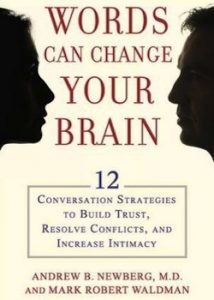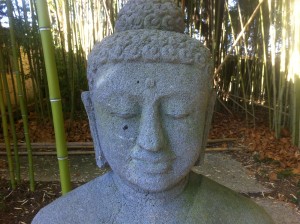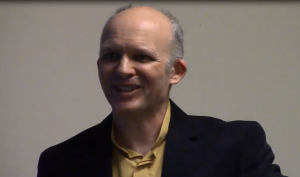What happens in your brain when you are creating?
In this fascinating episode, I am talking with Neuroscientist Dr. Andrew Newberg. We talk about his research field of Neurotheology and the connection between brain activity during creative states and religious or spiritual experiences.
Have you ever wondered what happens in your brain during a creative process, meditation or even during a spiritual or religious practice? Turns out many of these experiences are closely related in terms of what is happening inside our brain. Dr. Newberg talks about how they have used brain scan studies as well as looking into the subjective research into what people actually experience.
One of the most interesting areas we discuss in this episode is how words can actually change your brain and how you can use language in ways that create a deeper understanding and better relationships.
He touches on his research on the importance of communicating with our own personal values base actually creates a more meaningful connection.
Dr. Newberg talks about a simple values exercise that you can do to help you get clear on what your values actually are and how you can use them to help form better relationships. We also talk about how values seem to change from materialistic oriented to more empathetic or outward oriented values when people practice compassionate communication skills.
One of the questions I am always exploring the how we connect in the online world and what that might mean to how humans communicate. We talk about how some brief forms of virtual communication can actually be more effective than some types of in-person communications.
Listen to this fascinating episode and please share your comments and experiences.

Dr. Andrew Newberg
Dr. Andrew Newberg is the director of research at the Jefferson-Myrna Brind Center of Integrative Medicine and a physician at Jefferson University Hospital. He is board certified in internal medicine and nuclear medicine.
Andrew has been asking questions about reality, truth, and God since he was very young, and he has long been fascinated by the human mind and its complex workings. While a medical student, he met Dr. Eugene d’Aquili, who was studying religious experiences. Combining their interests with Andrew’s background in neuroscience and brain imaging, they were able to break new theoretical and empirical ground on the relationship between the brain and religion.
Andrew’s research now largely focuses on how brain function is associated with various mental states—in particular, religious and mystical experiences. His research has included brain scans of people in prayer, meditation, rituals, and trance states, as well as surveys of people’s spiritual experiences and attitudes. He has also evaluated the relationship between religious or spiritual phenomena and health, and the effect of meditation on memory. He believes that it is important to keep science rigorous and  religion religious.
religion religious.
Andrew has also used neuroimaging research projects to study aging and dementia, Parkinson’s disease, epilepsy, depression, and
other neurological and psychiatric disorders. Learn more at his website http://www.andrewnewberg.com/
Learn about his recent book “How Enlightenment Changes Your Brain” as well as the book we mentioned
during the show “Words Can Change Your Brain” as well as other books, and current research projects
 if the business you are in is worthwhile. Sometimes data and advisors are helpful but often, even if data supports it we somehow know the right choice in our gut.
if the business you are in is worthwhile. Sometimes data and advisors are helpful but often, even if data supports it we somehow know the right choice in our gut.


 Dan Huston: As a Full Professor in the English Department at NHTI, Concord’s Community College, Dan teaches mindful communication and writing, and he serves as assistant to the department head. He has been incorporating mindfulness, meditation, and emotional intelligence into his communication curriculum for over fifteen years and was awarded NHTI’s 2008 Chancellor’s Award for Teaching Excellence. Huston is the author of the textbook Communicating Mindfully: Mindfulness-Based Communication and Emotional Intelligence, as well as numerous other
Dan Huston: As a Full Professor in the English Department at NHTI, Concord’s Community College, Dan teaches mindful communication and writing, and he serves as assistant to the department head. He has been incorporating mindfulness, meditation, and emotional intelligence into his communication curriculum for over fifteen years and was awarded NHTI’s 2008 Chancellor’s Award for Teaching Excellence. Huston is the author of the textbook Communicating Mindfully: Mindfulness-Based Communication and Emotional Intelligence, as well as numerous other